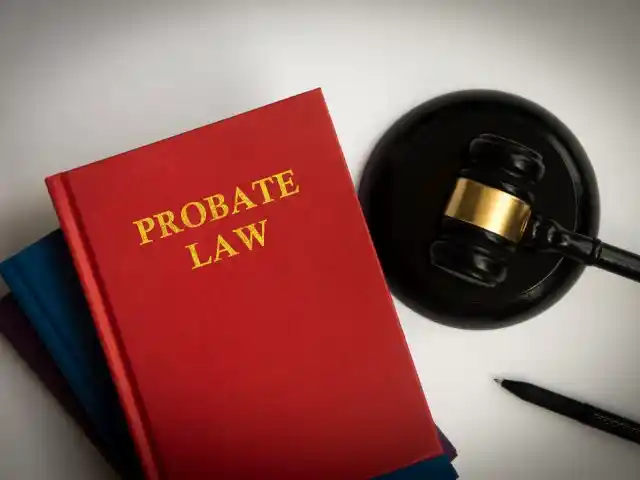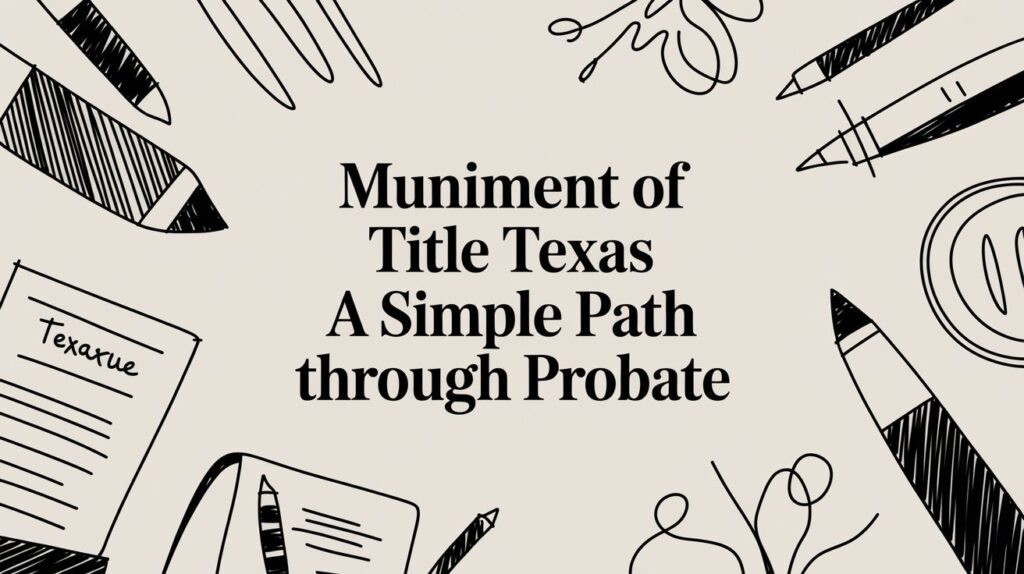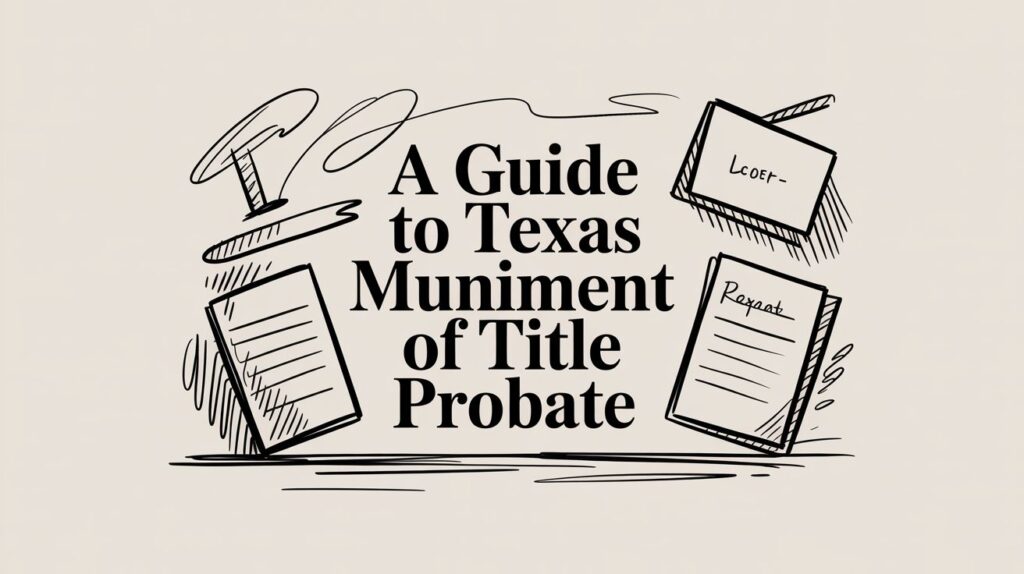So you’ve just discovered a will—maybe it was tucked away in a file cabinet, maybe in a safe deposit box—and now you’re asking, can you probate a will in Texas after 4 years? It’s a question more common than you might think, and the answer, like most things in probate law, is a bit more nuanced than a simple yes or no.
In Texas, the general rule is that a will must be filed for probate within four years of the decedent’s death. But—and this is a big but—there are exceptions. In fact, depending on the circumstances, you may still be able to probate a will after the four-year mark. The courts don’t shut the door completely; they just want to know why you waited.
This article breaks it all down. We’ll walk through what the law says, what judges look for when exceptions apply, and how to navigate probate after the deadline. Along the way, we’ll share real-world stories that prove you’re not alone—and that yes, under the right conditions, you can probate a will in Texas after 4 years.

The Four-Year Rule in Texas Probate Law
Texas Estates Code Section 256.003 lays down the foundation: A will must be filed for probate within four years of the testator’s death, unless the applicant is not “in default.” That phrase “not in default” is what gives the statute its teeth… and its wiggle room.
The law doesn’t say “never,” it says “unless.” So, the key question becomes: Why didn’t you file the will on time?
If you can prove that you weren’t in default—meaning you didn’t intentionally or negligently delay the filing—then a Texas court may allow the probate even after the four-year window has passed.
Let’s dig into what that really looks like.
What Does “Not in Default” Really Mean?
The term “default” in probate law doesn’t necessarily mean you acted with bad intent. It means the delay in filing was due to some level of carelessness, ignorance of the law, or avoidance. But if the delay was reasonable or caused by unavoidable circumstances, the court may still let you in the door.
For example:
- Maybe you didn’t know the will existed until recently.
- Perhaps the named executor passed away, and no one took over.
- Or maybe family conflict made filing impossible until now.
If you can show you acted in good faith once you learned of the will, the court will likely take a closer look at your request.

Real Story: Aunt Clara’s Lost Will
After Clara passed away in 2017, her estate went untouched because her only nephew, Luis, believed she had no will. In 2022, while cleaning out an old storage unit, Luis found a signed, notarized will in a sealed envelope. He brought it to an attorney, asking, “Can you probate a will in Texas after 4 years?”
The lawyer filed an application to probate as a muniment of title, arguing Luis wasn’t in default because he didn’t know the will existed. The court agreed, and Clara’s wishes were honored five years after her passing.
Probate as a Muniment of Title: The Go-To Option After 4 Years
If you’re past the four-year deadline, the most common workaround is probating the will as a muniment of title. It sounds fancy, but the idea is simple: You’re not opening a full estate. Instead, you’re asking the court to recognize the will solely to transfer title to property.
Here’s what you need to qualify:
- A valid will (with proper signatures and notarization)
- No unpaid debts owed by the estate (except secured debts like mortgages)
- Clear title transfer is needed for property or assets
- A valid reason for the delay in filing
This method is often faster, cheaper, and less invasive than full probate and Texas courts are generally open to it if you’re acting in good faith.
Example: Transferring the Family Home
Let’s say your dad died in 2018, but his will was never filed. Now in 2024, you’re trying to sell the family home that he left you in that will. Since you’re past the deadline, you can’t open a traditional probate estate—but you can probate the will as a muniment of title, using it to legally transfer ownership to your name.
What If You Waited Because You Thought There Was No Need?
Many families don’t rush to probate a will because they think there’s nothing to distribute. Maybe everything was joint tenancy. Maybe the surviving spouse just kept living in the home. But years later, something changes a death, a sale, a refinance and suddenly title needs clearing. One quiet assumption turns into a legal hurdle that now has to be dealt with.
This is when the “not in default” standard gets tested. Courts will ask:
- Did you act reasonably based on what you knew?
- Did you make an effort to understand your responsibilities?
- When did you become aware probate was necessary?
If you can build a narrative around good-faith actions, the odds shift in your favor. Judges often consider context and intent when deciding whether to grant an exception to the four-year rule.
The Role of Affidavits and Witnesses
When you’re seeking to probate a will late, the court will often require affidavits or testimony from people who can speak to:
- When the will was discovered
- Who had possession of it
- Why it wasn’t filed sooner
- Whether the applicant is acting in good faith
These affidavits help the judge understand the delay, especially if the will was kept in a safe place by someone outside the family or tucked away unintentionally. Providing clear and consistent supporting statements can significantly influence whether the court chooses to accept the late filing.

Story: The Safety Deposit Box Surprise
In 2023, Paula found her mother’s original will inside a safe deposit box while preparing to close the account. Her mother died in 2019, and everyone assumed she had no estate. But that will named Paula as the sole beneficiary of stocks and a piece of land in Guadalupe County.
With help from her lawyer, Paula submitted sworn affidavits from her siblings confirming they didn’t know about the will. The court approved the probate under the muniment of title exception, and Paula transferred the land within two months.
Who Can File the Will After 4 Years?
Here’s an important detail many people miss: You don’t have to be the named executor to file the will. Anyone with an interest in the estate an heir, a beneficiary, or even a creditor—can step in and request probate. This flexibility can be a lifesaver when the named executor is unavailable, unwilling, or already deceased.
However, the court still evaluates the applicant’s credibility and intent. Acting promptly and transparently goes a long way in building trust with the court. The more cooperative and forthcoming you are with the court and other potential heirs, the smoother the process will likely be.
What If There Are Other Heirs Who Already Took the Property?
This situation happens more than you’d expect. Someone dies, no will is probated, and years later, one heir sells or moves into the home as if it’s theirs. Then someone else finds the will, which says something completely different. These surprises often surface during sales, refinancing, or family disputes.
Can you still probate the will? Yes, but now you’re dealing with a contested probate and possibly a title dispute. That’s a different level of legal challenge, but the law still allows you to make your case—especially if your delay wasn’t intentional. With the right legal support, even complex disputes involving property already transferred can sometimes be resolved through the probate process.
Strategy Tip: Act Quickly Once You Discover the Will
Even if you’re past the four-year deadline, courts care about your actions after you discover the will. Did you wait another year to file? Or did you talk to a probate attorney within weeks? Showing urgency proves that you’re not in default—it shows you’re acting with purpose.
When Probate Isn’t Possible: Alternatives to Consider
There are some situations where even the muniment of title route won’t work. Maybe the estate has unresolved debts, or the will can’t be verified. In those cases, you still have options:
- Affidavit of Heirship: Useful if there’s no will or if probate is too complicated
- Small Estate Affidavit: Only works if there’s no will and the estate is under $75,000 (excluding the homestead)
- Judicial Determination of Heirship: For settling title when no probate was opened
Each option comes with its own legal hurdles, but with guidance, you can still achieve asset transfers legally.

Final Thoughts: Timing Matters, But So Does Intention
So, can you probate a will in Texas after 4 years? Yes—but only if you weren’t in default and can show the delay wasn’t intentional. Texas courts don’t slam the door shut on late probate filings, but they do want a clear explanation.
Key Takeaways:
- Texas law sets a four-year deadline to file a will for probate, but exceptions apply.
- Courts allow probate after the deadline if the applicant is not in default.
- Probating a will as a muniment of title is the most common solution after 4 years.
- You’ll need supporting documents, such as affidavits, to prove why the delay occurred.
- Acting quickly once the will is found strengthens your position with the court.








